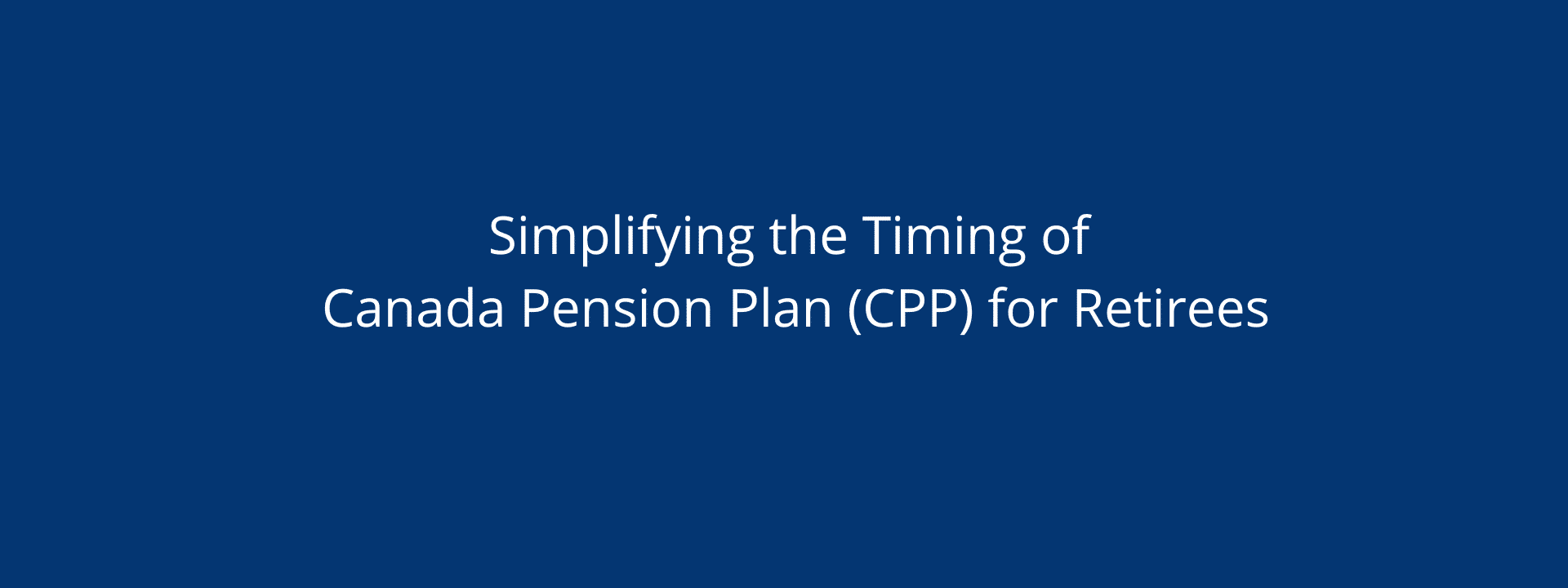One question that arises often among retirees is, “When should we start taking CPP (Canada Pension Plan)?” Is it better to begin receiving benefits as early as possible or defer them longer?
Understanding Canada Pension Plan (CPP)
The Canada Pension Plan (CPP) is a government pension program that provides lifelong income starting at age 65. The maximum monthly benefit for 2023 is $1,306.57, adjusted annually in January based on the Consumer Price Index (CPI). The amount you receive depends on your age and contributions from the age of 18.
When Can You Start CPP?
You can choose to start CPP as early as age 60 or defer it until age 70. Here are the implications:
- Before age 65: If you opt to receive CPP before age 65, your benefit amount is reduced by 7.20% per year or 0.60% per month.
- Delay to age 70: If you wait until age 70, your benefit increases by 8.4% per year or 0.70% monthly after age 65. Keep in mind that you must apply to start receiving the benefits.
- Post-Retirement Benefits: If you continue working past age 65, you can increase your CPP benefits.
Eligibility Criteria
To be eligible for CPP, you need to meet the following requirements:
- Work in Canada and contribute to CPP from age 18 onward.
- Earn more than the minimum threshold, which is $3,500 in 2023.
- Contribute to CPP on earnings up to a maximum of $66,600 in 2023.
- If employed, you and your employer contribute 5.95% each. If you are self-employed, you contribute the full amount.
What Should You Consider?
A research paper by Bonnie-Jeanne MacDonald for the National Institute on Aging highlights the benefits of delaying CPP. However, financial decisions should be personalized. Consider the following steps to review your options:
- Review Your Plan: Evaluate projected CPP amounts for yourself and your spouse/common-law partner and incorporate them into your retirement income plan. Modelling different start dates can help determine the best approach for your family.
- Break-Even Ages: Use a break-even calculator to determine the age at which delaying CPP would result in higher lifetime income. Based on an example of receiving 75% of the maximum benefit, inflation of 2% and a rate of return of 4%:
- Starting CPP at age 60 vs. delaying to age 70: Break-even age is 79. If you live past age 79, delaying CPP is more advantageous.
- Starting CPP at age 60 vs. delaying to age 65: Break-even age is 75. If you live past age 75, delaying CPP is more advantageous.
- Starting CPP at age 65 vs. delaying to age 70: Break-even age is 84. If you live past age 84, delaying CPP is more advantageous.
(Source: CPP Benefits Calculator, Global & Mail)
Other Practical Considerations:
- CPP Survivor Pension: Assess how starting your own CPP would impact the CPP survivor pension.
- Guaranteed Income Supplement (GIS): Review how the start date of CPP could affect GIS.
Factors for Starting CPP Earlier:
- Health and family history indicates a shorter projected lifespan.
- Need for income to cover lifestyle expenses at age 60.
- Concerns about potential Old Age Security (OAS) recovery tax or clawback if additional income is received at age 65 or later.
- Higher activity level and desire for increased lifestyle spending before the break-even age.
- Uncertainty about future CPP changes.
- Existing debt that could be paid down with CPP payments.
- Spousal benefits for CPP are calculated based on starting at age 65.
Factors for Deferring CPP:
- No immediate need for income due to alternative income sources or assets.
- Worries about healthcare or living expenses in your 80s.
- Family with a history of long lifespans.
- Flexibility to start CPP at any time, allowing for annual review.
- Protection against longevity risk, inflation, and investment returns.
- Consider a split strategy for couples/CLPs, with one starting CPP at retirement and the other delaying.
How to Obtain a CPP Estimate
You can review your projected monthly CPP amount using the ‘My Service Canada Account’ from the Government of Canada. If you don’t have one, you can register for one.
Review your Personal Financial Situation
Every individual’s financial situation is unique. Consult your financial advisor, who can use financial planning software to run scenarios and help determine the optimal CPP start age based on your specific requirements, such as cash flow, tax planning, withdrawal rate, other sources of income, financial assets, wealth transfer goals, plan success rate, and legacy aspirations.
For more information, refer to Preserving Wealth: The Next Generation – The definitive guide to protecting, investing, and transferring wealth by Jack Lumsden, MBA, CFP®.
For your FREE Copy of Preserving Wealth: The Next Generation, CLICK HERE
For your free retirement review, CLICK HERE
This material is provided for general information and is subject to change without notice. Every effort has been made to compile this material from reliable sources; however, no warranty can be made regarding its accuracy or completeness. Before acting on any of the above, please make sure to see me for individual financial advice based on your personal circumstances. The information provided is for illustrative purposes only. Commissions, trailing commissions, management fees and expenses may all be associated with mutual fund investments. Mutual funds are not guaranteed, their values change frequently, and past performance may not be repeated. Please read the Fund Facts and consult your Assante Advisor before investing.
Insurance products are services provided through Assante Estate and Insurance Services Inc.

